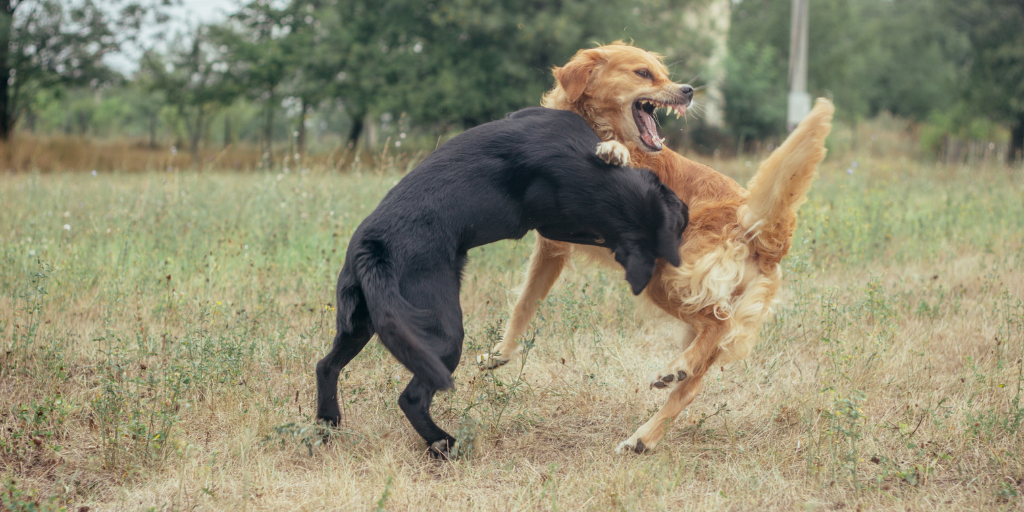It's a pretty well-known fact that dogs love to play! And it's important that they get playtime for physical, mental and social enrichment. When dogs play, things can get a bit rowdy and rambunctious. It's usually normal for dogs to bite, bark and growl in a playful manner as well as roughhouse or play fight (which includes jumping, chasing, wrestling, lunging, swiping and more). But sometimes, things can turn from friendly to over-the-top and aggressive, which can get dangerous. To keep your dog and other dogs safe, it's important to know how to identify the signs of aggression when things are progressing in the wrong direction.
First, what influences aggressive behavior in dogs?
Here are four factors that may cause a dog to show aggression:
- Stress and fear
- Social development (dogs who may not have had proper socialization)
- Learned behavior (if aggression resolves the issue, that reinforces the behavior)
- Hormones (higher levels of testosterone as well as females in breeding season or with litters)
So what are some signs of aggressive behavior?
It's important to remember that aggressive behavior does not mean a dog is aggressive. In fact, some aggressive behaviors are actually socially appropriate. For example, a mother growling at her puppy for pulling on her tail is considered appropriate aggression. But biting or hurting the puppy would not be appropriate. Being able to tell the difference will go a long way in helping keep your dog and other dogs safe. It will help you understand when to intervene to prevent escalation. In general, if there's an aggressive moment during play time, it's typically best to intervene rather than let the dogs work it out themselves.
Pro Tip: When a dog shows aggression to another dog, they may end up redirecting their aggression toward you when you intervene. It's often because of frustration or the fact that they are already amidst exerting the energy and emotion. This is sometimes referred to as "redirected aggression."
Watch for signs of stress or warning, as well as stiff and unrelaxed body language, when dogs are playing as those are hints that things can turn more volatile. Signs of aggressive behavior (and that it's time to intervene) include:
- Snarling (tiny muzzle movements like a lip snarl may indicate that your dog is uncomfortable. This is typically the step before growling or snapping.)
- Growling (deep and low growling as well as growling with stiff, tense or rigid body language. Remember, many dogs growl during play but it's accompanied by relaxed and loose body language.)
- Stiffness (tight, unrelaxed and tense body language including a rigid and stiff-legged stance - also look for tight muscles or furrowed brows on their face).
- Freezing (freezing up or stillness is another indicator of stress, discomfort or nervousness.)
- Direct stare (intently focused on another dog without blinking as well as excessive stalking.)
How to Prevent Aggressive Behavior
The best way to discourage aggressive behavior from your dog is with training and socialization. It's much easier to prevent aggression than correct it, so starting your pup early is ideal. In addition, socializing your dog with both puppies and adult dogs is helpful and make sure to reinforce positive interactions too.
Read more: Why Is Socialization Important For My Dog?
A few other tips to help with aggression are neutering or spaying your dog, supervising your dog in situations where they can learn inappropriate behaviors to prevent those behaviors from being reinforced, treating your dog kindly and general positive reinforcement. And remember, just because a dog exhibits aggressive behavior does not mean he or she should be labeled as aggressive.

